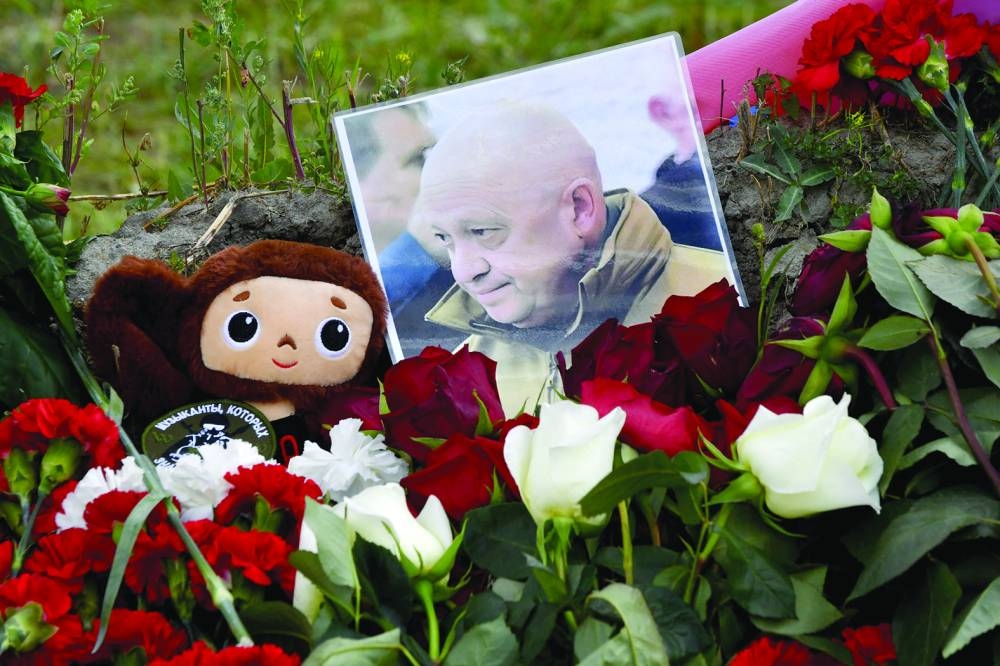The Kremlin has dismissed rumours it orchestrated the death of Wagner chief Yevgeny Prigozhin, presumed dead in a plane crash two months after leading a mutiny in Russia.
It also announced by decree that Russian paramilitary fighters will be obliged to swear an oath to the Russian flag, as part of measures to rein in groups like Wagner in wake of the uprising.
Speculation the Kremlin may have been involved in Wednesday’s crash has been rife, with Western leaders, Kremlin critics and even pro-Kremlin figures floating the idea Prigozhin might have been assassinated.
On Friday Kremlin spokesman Dmitry Peskov described the incident as “tragic” to reporters, echoing President Vladimir Putin’s words the previous evening.
He also addressed the accusations of foul play.
“Of course, in the West, this speculation is being presented from a certain angle. All of this is an absolute lie,” Peskov said, urging patience as investigators look into the fatal crash.
Earlier on Friday Russian Deputy Foreign Minister Sergei Ryabkov scolded US President Joe Biden for expressing his lack of surprise that Prigozhin had been killed in a plane crash, accusing Biden of disregarding diplomatic norms.
Belarusian strongman Alexander Lukashenko, a close ally of President Vladimir Putin who mediated the deal that ended the June mutiny, said he “can’t imagine” the Russian President ordered the assassination.
“It’s too rough and unprofessional work, if anything,” he was cited as saying.
Russian officials have already opened a probe into air-traffic violations.
On Friday investigators announced that they had recovered 10 bodies as well as flight recorders from the scene.
“The investigation will scrutinise all possible versions of what happened,” the country’s Investigative Committee said in a social media post.
Putin broke his silence on the crash on Thursday, offering condolences to the families of the 10 people onboard and describing the incident as a “tragedy”.
He said that Prigozhin, who in June led an armed mutiny against Russia’s military leadership, had made some “serious mistakes in his life” and had had a “complicated fate”.
Some observers say his short-lived but bloody rebellion was the biggest threat to Putin’s long rule.
Asked if the Kremlin had received official confirmation of Prigozhin’s death, Peskov said: “If you listened carefully to the Russian president’s statement, he said that all the necessary tests, including genetic tests, will now be carried out. The official results – as soon as they are ready to be published, will be published.”
While Putin used the past tense to refer to him, Peskov said work was being carried out to formally identify Prigozhin as among the victims.
“As soon as the results are in, they will be published,” he added.
As to whether Putin would attend Prigozhin’s funeral, he said: “At the moment there is no date for the funeral, it is not possible to talk about this.
“The president’s work schedule is quite busy at the moment,” Peskov added.
In an address on Thursday, Putin said he had known Prigozhin – once a loyal ally – since the early 1990s. Both hail from Russia’s former imperial capital of Saint Petersburg.
Under Putin, Russia has a history of mysterious deaths.
For many in Russia, the fact Prigozhin’s armed march on Moscow ended in an unusual deal that involved the Kremlin allowing the rebellious warlord to go into exile in Belarus had raised eyebrows.
Many Western officials said the timing of the crash was suspicious coming two months to the day after the mutiny.
After the mutiny, Moscow moved quickly to disarm the group and transfer its heavy weapons to the defence ministry, and on Friday Putin signed a decree forcing paramilitary fighters to swear an oath.
International non-governmental organisations (NGOs) and UN-mandated experts have regularly accused the Wagner group of war crimes.
With Prigozhin’s apparent demise, the fate of his private army Wagner – which rose in influence during the Ukraine offensive but is also present in African conflicts – remains unclear.
“I can’t tell you anything right now. I don’t know,” Peskov said, regarding what might come next for the mercenary outfit.
After the June mutiny, Moscow was careful to run a campaign against the outspoken Wagner chief – but not against his fighters, who spearheaded Russia’s advance in key battles in Ukraine and were seen as heroes back home.
“As the president has said many times, the Wagner group made a great contribution to the special military operation,” Peskov said, using Kremlin-approved vocabulary to describe the conflict. “The heroism of these people will not be forgotten. That is what the president said.”
As part of the deal that ended Prigozhin’s mutiny, Wagner fighters set up camp in neighbouring Belarus.
Belarus’s leader said Wagner members would remain in the country.
“Wagner lived, is alive, and will live in Belarus,” Lukashenko was quoted as saying by state-run news agency Belta, without specifying who would lead the personnel.
Even after his mutiny, Prigozhin enjoyed some popularity in Russia, with many nationalist-leaning Russians embracing his tough-guy talk.
Nigel Gould-Davies, a former British ambassador to Belarus who is now a senior fellow at the International Institute for Strategic Studies (IISS), said the funeral would be significant.
“If Putin wishes to emphasise that Prigozhin died as a traitor, he will ignore it,” said Gould-Davies.
“(While) Prigozhin’s supporters may use it as an opportunity to eulogise him and his critique of the Kremlin’s conduct of the war – and could strengthen the hostility of a core of Wagner loyalists towards the Kremlin,” he said.
British military intelligence said on Friday there was not yet definitive proof that Prigozhin had been onboard but that it was “highly likely” he was dead.
The Pentagon has said its own initial assessment is that Prigozhin was killed.

A portrait of Yevgeny Prigozhin is seen amid flowers at a makeshift memorial in front of the Private Military Company (PMC) Wagner Centre in Saint Petersburg.
